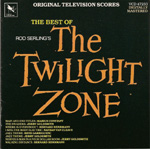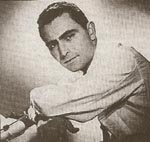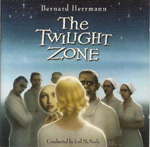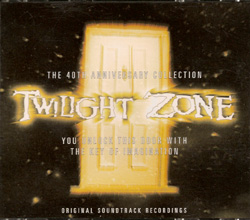Bernard Herrmann ’s “Walking Distance” -
A Remembrance of Story and Music Brilliance

On the 50th anniversary of the television premiere in 1959,
here is an article about what is generally considered to be
the best music score of the entire TWILIGHT ZONE (TZ) series.
First broadcast: October 30, 1959, "Walking Distance" was the 5th episode of First Season of THE TWILIGHT ZONE.
Letter dated October 6, 1959 sent to Bernard Herrmann:

This is a belated congratulatory tome to acknowledge what is one of the most beautiful music scores I've been privileged to hear. I'm referring to the background music to "Walking Distance." It is a lovely, sensitive and most inspiring theme. Thank you for lending a great talent to our project.
Sincerely,
Rod Serling
--from the book, AS TIMELESS AS INFINITY: The Complete Twilight zone Scripts of Rod Serling, Volume Two. Edited by Tony Albarella, Gauntlett Publications, 2005.

Walking Distance: Going Back To Homewood
By Roger Hall
© Film Music Review, 2009

I first watched this enthralling episode when it premiered back in 1959. I was then only a teenager in high school and yet I could tell this was a very special story, with a great deal of emotional longing for recapturing the carefree days of one’s childhood.
Riding The Carousel
I read that this episode was Rod Serling’s remembrance of his days growing up in his hometown of Binghamton, New York. I once lived in that same city myself and for the TZ 50th anniversary, I visited once again the carousel in Rec Park, which Serling remembered from his youth.

I also had the great pleasure of riding that same carousel which Rod Serling had used when he was a boy in Binghamton and which was the inspiration for the climactic scene in "Walking Distance."

I picked a horse to ride on similar to one shown in "Walking Distance." Binghamton is so fortunate to still have this beautiful carousel and be able to have it available to ride for kids of all ages.
Like Rod Serling, I often returned to my hometown. In my case it was in New Jersey and while visiting the places of my youth I tried to recapture my best childhood memories. I couldn't be transported back in time like THE TWILIGHT ZONE, but when I walked around my hometown, I thought about the "Walking Distance" episode and the memorable emotional music by Bernard Herrmann. I wondered where he got his ideas for his memorable score.
Handeled by Herrmann
About twenty years ago while attending a classical concert in Boston, I heard a beautiful Pastoral Ode based on poems by John Milton, with music by
George Frideric Handel (1685-1759). It was titled: L’Allegro, il Penseroso, ed il Moderato. At the end of Part One, the chorus sings a peaceful conclusion to the scene with these words:
Thus past the day, to bed they creep
By whisp’ring winds soon lull’d asleep.

To my amazement some of this serene music was almost the same as that used by Herrmann in the TZ episode for the cue, "Martin's Summer."
But Herrmann had not just quoted it once. Instead, he extended Handel’s music theme with a series of sequences, moving up and down like the wooden horses moving on the carousel in the"Walking Distance" episode. This memorable music enhances the nostalgic feelings about one’s childhood and how fleeting it can be as remembered years later. Herrmann's clever use of Handel's theme in "Walking Distance" shows how much music Herrmann was aware of in the classical world and he was especially fond of music from England, like Handel's beautiful Ode.
In his excellent book, A Heart At Fire's Center: The Life and Music of Bernard Herrmann, Steven C. Smith mentions that this episode "recalls (in style, not theme) one of Herrmann's favorite pieces of film music: Walton's passacaglia for Falstaff's death in Olivier's HENRY V." But the Handel music I mentioned seems to be what Herrmann was quoting in his cue for "Martin's Summer."
Memories of Martin
I hope you will pay special attention to the music for "Martin's Summer" when you watch this episode. See if it doesn't move you causing a tug to your emotions and maybe bring a few tears to your eyes, as it has for me.
With accomplished acting by Gig Young as Martin Sloan, and Frank Overton as Martin’s dad; the beautiful cinematography by George T. Clemens; the skillful direction by Robert Stevens, but most of the all the brilliant script by Rod Serling and the masterful score by Bernard Herrmann, "Walking Distance" is an unforgettable television episode.
It takes you back in time...
back to Homewood...
a place worth visiting over and over again.
-- Roger Hall, October 2009
Mr. Hall is a longtime film music critic and Managing Editor of Film Music Review. He has written extensively about Bernard Herrmann including an entry in the American National Biography, and an article in Film Score Monthly--
"From Hitchcock to Harryhausen: Ten Essential Herrmann Scores" (April/May 2000).
Both articles are included on this special limited edition disc:
OBSESSION:
A Tribute To Bernard Herrmann
++++++++++
…his [Herrmann's] gentle and evocative score permeates the episode, omnipresent, yet unobtrusive. Listening to this score, composed specially for this episode, it is hard to believe any composer – particularly one with such distinguished credits in feature films – would bother to take such pains…But to Buck Houghton, there’s no mystery behind the excellence of the “Walking Distance” score. “When you have a good rough cut, a musician does a better job than he would with a less distinguished picture. Bernie responded very strongly to things that he thought were very good. It’s a GREAT score.”
– Marc Scott Zicree, The Twilight Zone Companion, page 44.
This is one of the very best ‘moody’ and thoughtful Twilight Zone episodes, and the only lushly stringed score Herrmann composed for The Twilight Zone. The autograph score is at UCLA Music Library Special Collections. The music was recorded for CBS Music Library. The title page gives the date of August 15, 1959. Instrumentation: 6 violins I, 4 violins II, 3 violas, 3 celli, 2 basses, and 1 harp (19 players). The score is 14 pages in length comprised of eleven cues:
#2070: “Intro”
#2071: “The Drugstore”
#2072: “Memories”
#2073: “The Park”;
#2074: “The House”
#2075: “Curtain”
#2076: “The Parents”
#2077: "The Merry-Go-Round”
#2078: "Martin’s Summer"
#2079: “Elegy”
#2080: “Finale”
– Prepared by Bill Wrobel, Film Score Rundowns, 2003
++++++++++
For more of the FMR 50th anniversary tribute at
THE TWILIGHT ZONE Revisited
++++++++++
Recommended CDs
.jpg)
It was named Editor's Choice, Best CD of the Month for December 2007, and also
received a Sammy Film Music Award for Best Restored Film Score of 2007.
FAHRENHEIT 451 (1966) and
"Walking Distance" from THE TWILIGHT ZONE (1959)
The Moscow Symphony Orchestra,
conducted by William Stromberg

Bernard Herrmann: THE TWILIGHT ZONE
re-recordings conducted by Joel McNeely of all the Herrmann scores, including: "Where Is Everybody?; "Walking Distance"; "The Lonely"; "Eye Of The Beholder"; "Little Girl Lost"; "Living Doll"; "Ninety Years Without Slumbering"; and Twilight Zone themes

THE BEST OF THE TWILIGHT ZONE --
includes original scores by Jerry Goldsmith ("The Invaders"/"Nervous Man In A Four Dollar Room"/ Jazz Theme), Bernard Herrmann ("Where is Everybody" and "Walking Distance"), Nathan Van Cleave ("I Sing The Body Electric"), Rene Garriguence (Jazz Theme), and Marius Constant (Main and End Titles).

TWILIGHT ZONE:
THE 40TH ANNIVERSARY COLLECTION
(4 CD box set)
"Walking Distance"
(CD One, track 17, 12:24)
THE TWILIGHT ZONE: Reader's Poll
Editor's Note:
In the now defunct Twilight Zone Magazine from March/April 1984, there was a list of favorite episodes from a Reader's Poll.
The Top 20 favorites are listed below and I have added the scores after each title, several of them composed by Bernard Herrmann.
-- Roger Hall

In commenting about the series some years ago, Rod said, "We had some real turkeys, some fair ones, and some shows I'm really proud to have been a part of."
My feeling is that the program was at its best when it went beyond pure entertainment and dealt with timely issues and ideas, giving a gentle prod to the viewer and making him think. If there is a lingering message to be found in The Twilight Zone, it is a reminder of man's inhumanity to man -- and a warning that the crime of the century is a lack of caring and the loss of our capacity for outrage.
-- Carol Serling, Associate Publisher
Here are the results of the Reader's Poll:
1. "Eye Of The Beholder" (a runaway favorite) -- music: Bernard Herrmann
2. "Time Enough At Last" -- music: Leith Stevens
3.
"Nightmare
At 20,000 Feet" -- music: stock
4. "To Serve Man" -- music: stock
5. "Night Of The Meek" -- music: stock
6. "It's A Good Life" -- music: stock
7. "Walking Distance" -- music: Bernard Herrmann
8. "A Stop At Willoughby"
-- music: Nathan Scott
9. "The Invaders" -- music: Jerry Goldsmith
10. "The Monsters Are Due On Maple Street" -- music: Rene Garriguenc
11. "Living Doll" -- music: Bernard Herrmann
12. "Five Characters In Search Of An Exit" -- music: stock
13. "The After Hours" -- music: stock
14. "Kick The Can" -- music: stock
15. "The Obsolete Man" -- music: stock
16. "A Hundred Yards Over The Rim" -- music: Fred Steiner
17. "A World Of His Own" -- music: stock
18. "And When The Sky Was Opened" -- music: Leonard Rosenman
19. "Will The Real Martian Please Stand Up?" -- music: stock
20. "Death's Head Revisited" & "Nothing In The Dark" (tie) --
music: stock
.jpg)
A GUIDE TO FILM MUSIC -
Songs and Scores

Film Music Review (Home Page)
